The Ultimate Guide To VW Service & Maintenance
“Fahrvergnugen”... remember that?
One of the multitudes of goofy Volkswagen commercials of the past made reference to this German idea. Roughly translated, it means something similar to “driving pleasure.”
If you own a VW, chances are good you know exactly what this means - a Volkswagen is simply fun to drive!
So, how do you keep your Volkswagen running smoothly and in great shape for years to come? What are the best practices when it comes to VW service and maintenance?
Keeping your VW running like a charm requires a bit of accountability on your part, but properly maintaining your V-Dub ensures a long and happy relationship with your car.
Thankfully, the team at Autohaus Social is here to help you keep your Volkswagen in tip-top shape. We know how important your car is to you, and we are here to help you keep that silky-smooth ride!
If you are in the Atlanta area, stop by our shop to receive the best VW service in the Atlanta region!
Alright, ready to learn everything you need about maintaining your VW?
Let’s get started!
Importance of Routine VW Service
Maintaining a vehicle is a lot like keeping your body in good shape.
Part of the keys to living a long, full life is having the right exercise and proper nutrition, right?
Well, your Volkswagen needs a healthy lifestyle as well!
Your car has many different parts that need to work properly by themselves, and they also need to work together in systems. Each system is made up of multiple components and fluids.
The problem is that all parts and fluids eventually fail and break down. Because of this, it is crucial to monitor and regularly maintain the health of these individual systems, parts, and fluids to keep your VW running its best.
By maintaining the multitude of parts and exchanging (also known as flushing) the fluids at recommended mileage intervals, you maximize your vehicle’s health and minimize the need for expensive or unscheduled repairs.
Read our article on the importance of routine maintenance to learn more about the importance of a regular car schedule.
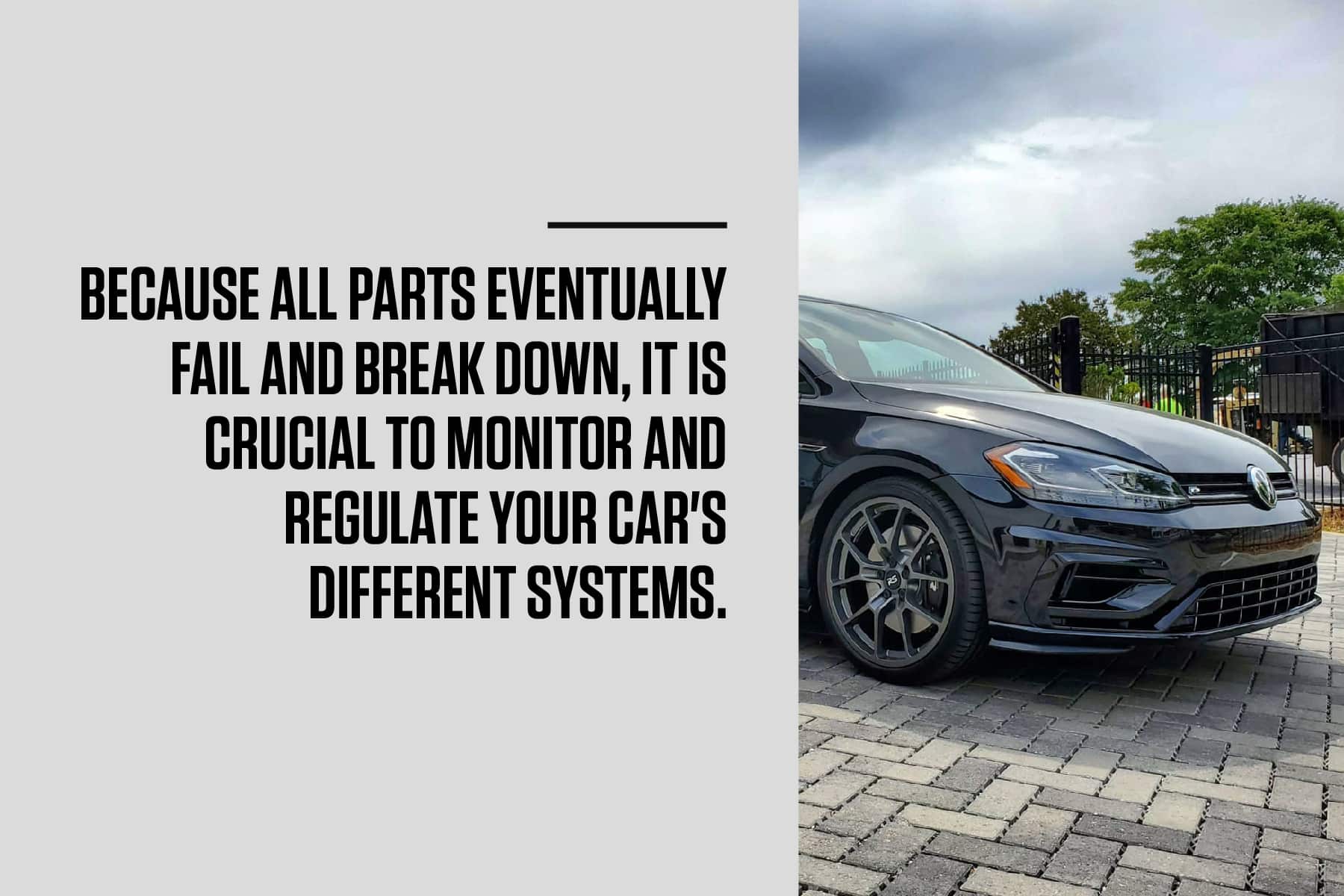
The Ideal Volkswagen Service Schedule
Every engine and car model designed by the VW Group is slightly different, but the general maintenance schedule for each is similar.
The following are examples of the suggested schedules developed by the VW Group for the proper maintenance of their exceptional products. Keep in mind that each engine and model manufactured by Volkswagen varies.
Always refer to your owner’s manual, or call a trusted automotive facility, for guidance specific to your vehicle.
Oil changes
Oil changes should be performed every 5000 or 7500 miles, depending on the particular vehicle/engine, despite VW’s claim of 10,000-mile intervals.
Why do we recommend a different schedule than VW?
Recently, many car manufacturers have increased recommended oil change intervals to reflect increasing motor oil quality and technology. They also want to decrease the cost of ownership figures.
However, for the engine’s long term care, oil changes should be performed more frequently than these manufacturer’s suggested mileage intervals.
Remember, your car is like a hard-working human body.
You wouldn’t recommend an athlete do some light stretching and take a few walks each week to stay in shape, right? The same is true for your vehicle. The more you expect from your Volkswagen, the more care it deserves.
Here at Autohaus Social, we suggest oil changes at 7500-mile intervals for vehicles under 70,000 total miles and every 5000 miles for vehicles above 70,000 miles.
For VW performance models, we suggest changing the oil every 5000 miles regardless of accumulated miles due to the rigorous demands a performance engine endures.
Air and Cabin Filters
Volkswagen recommends air and cabin filters every 20,000 miles. However, drivers need to understand that variables such as geography, season, climate, and driving habits affect this mileage number.
We suggest inspecting the status of these filters during every service to determine the filter’s condition, rather than only relying on a mileage replacement schedule.
Why is having clean air and cabin filters important?
It’s pretty simple - air needs to pass through various systems to keep the car functioning properly. If debris, dust, or other residue restricts the airflow, engine components can start breaking down.
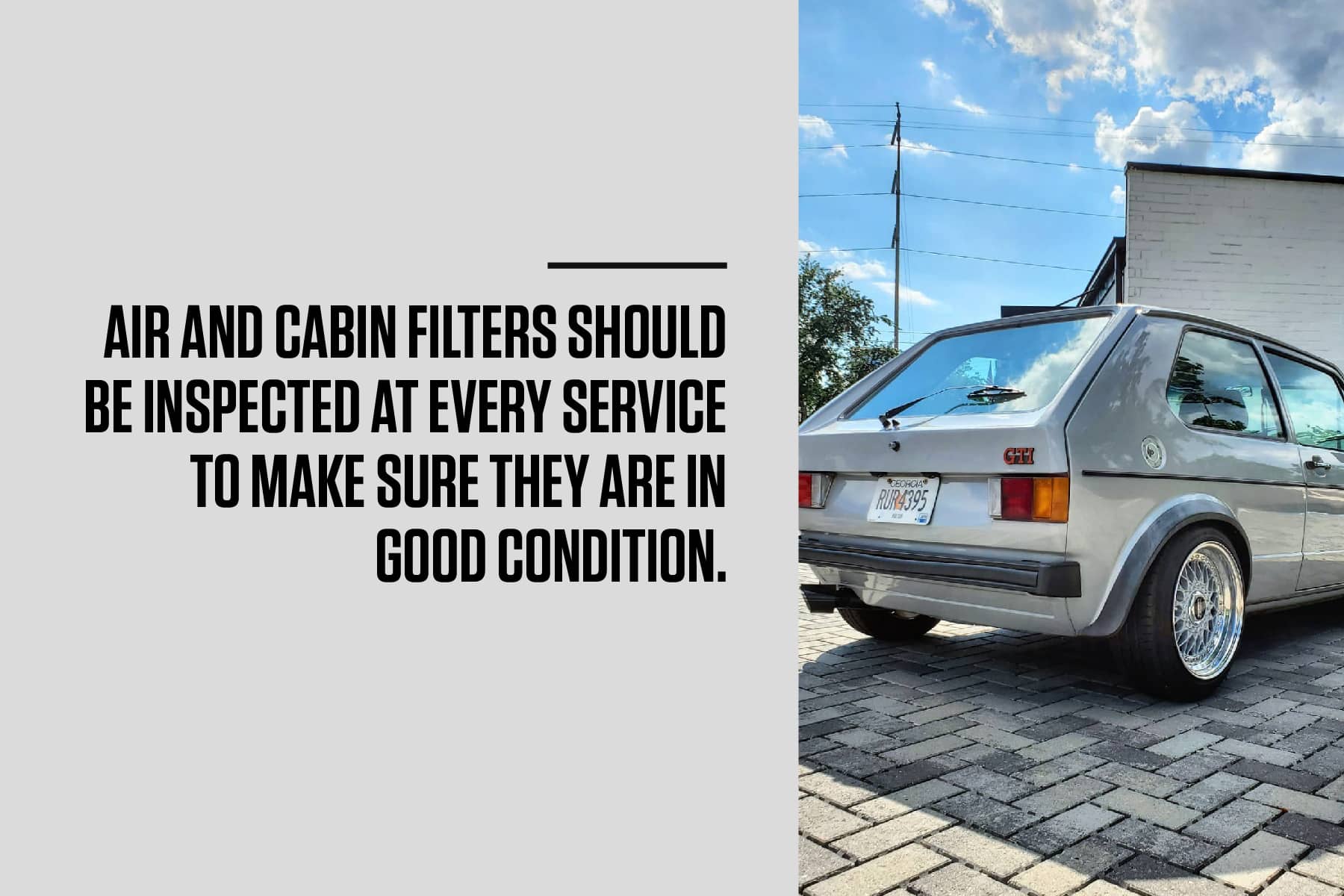
Fuel Filters
Fuel filter replacement intervals vary based on the particular engine and whether a vehicle has a gas or diesel engine.
Diesel fuel filters for Volkswagens should be replaced at 40,000-mile intervals, and gas models at less frequent intervals.
The purpose of fuel filters is similar to the air filters.
Fuel must flow to the engine at a predetermined rate. To do that, the fuel’s path must be clear. A fuel filter's purpose is to remove debris within the fuel inside the tank.
If small particles get inside the engine, they damage the injectors, high-pressure pumps, and other engine parts. It also affects fuel pumps - resistance caused in the fuel lines from a dirty filter can cause fuel pumps to wear out sooner than designed.
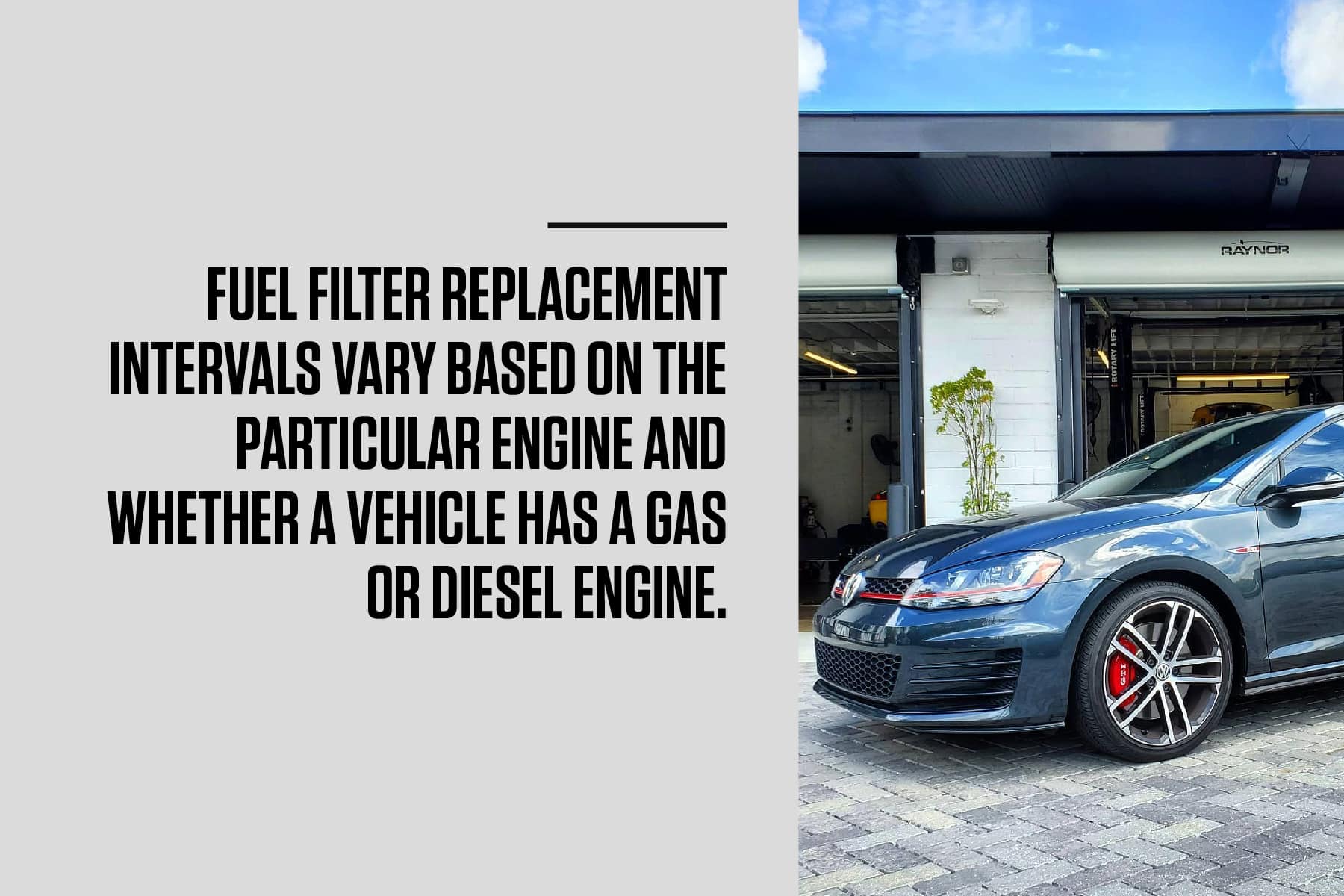
Brake Fluid
Brake fluid should be exchanged (flushed) every 30,000 miles or every 3 years, whichever comes first.
If you have a performance VW or track car, the brake fluid should be changed more often.
Why is it important to keep track of your brake fluid?
Like any synthetic fluid, brake fluid eventually breaks down in its chemical makeup due to heat, pressure, and time. When the fluid breaks down, the pedal pressure and braking power is diminished.
If this breakdown continues without being addressed, it becomes a safety issue and can result in an accident.
Coolant/Antifreeze Replacement
Coolant, also known as antifreeze, should be replaced or flushed every 40,000 miles or whenever a coolant part is replaced.
Coolant system parts include the radiator, thermostat, hoses, heater core, and other related components.
What makes proper coolant flow so essential to a car’s maintenance?
Over time, small particles of debris form inside the coolant system. If not addressed, these particles clog or restrict the flow of coolant, resulting in extensive damage to the coolant system.
Flushing the coolant system cleans it out and helps protect the existing parts.
Spark Plugs
Each Volkswagen engine has a different spark plug replacement schedule, and this schedule should be adhered to diligently.
Replacing spark plugs as recommended is critical to minimize damage to the engine if spark plugs are worn or fouled and begin causing “misfires.”
Why are engine misfires such a problem?
By definition, misfires are the failure of one or more spark plugs or coil packs to ignite or “fire” properly. If misfires continue, they eventually damage the catalytic converter, and replacing the catalytic converter is a costly repair.
This is a classic example of how following the suggested maintenance schedule saves an expensive repair: Changing the spark plugs as directed by VW helps avoid a much more costly expense if the car’s catalytic converter would break and need to be repaired.
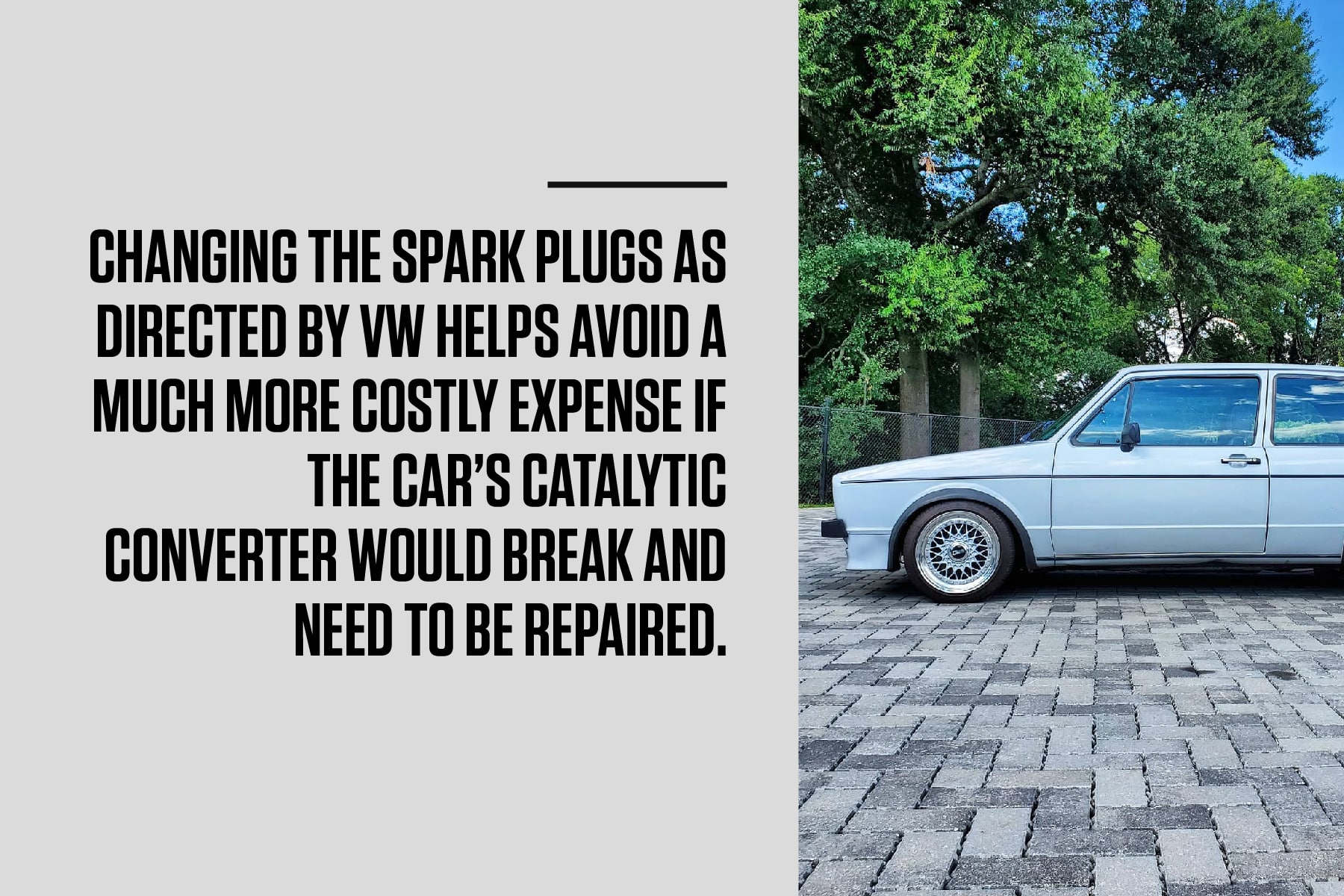
Timing Belts and Chains
Timing belt replacement is one of the most essential services for a VW engine based on specific mileage intervals.
Failure to adhere to the recommended replacement interval causes significant engine damage if the belt breaks!
Thankfully, timing belt service isn’t needed too frequently - it is recommended every 80,000-90,000 miles, depending on the particular engine.
Timing chains are less problematic than belts in terms of a critical failure because you usually have a warning. Typically, a trouble code presents itself with physical symptoms like clicking noises or the vehicle running roughly.
If you hear or sense these symptoms, they are indications that the chain and associated parts are wearing out and need immediate replacement.
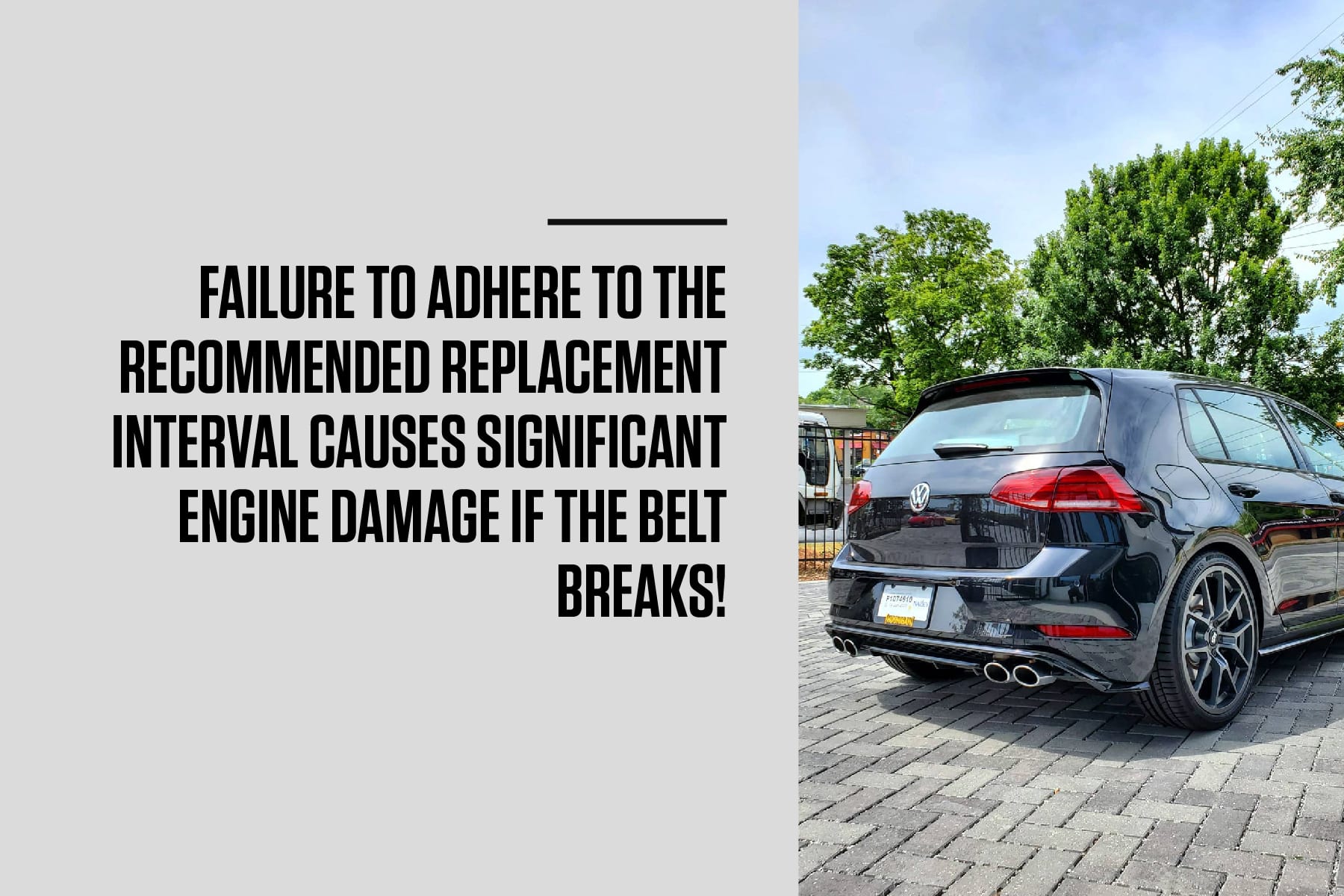
Transmission Service
A VW’s transmission service frequency varies greatly based on the type of transmission.
Check your owner’s manual or contact a trusted Volkswagen facility to determine the correct service interval. Failure to adhere to proper transmission service schedules can result in costly repairs.
Tire Rotations
To extend the life of your VW’s tires, Autohaus Social recommends the following tire rotation schedule:
Standard cars: Every other oil change
Crossovers and SUVs (such as the Q series): Every oil change
What makes regular tire rotations a vital part of VW service?
Rotating your tires at consistent intervals helps the tire’s tread wear down evenly, and this helps maintain proper traction, handling, and safety.
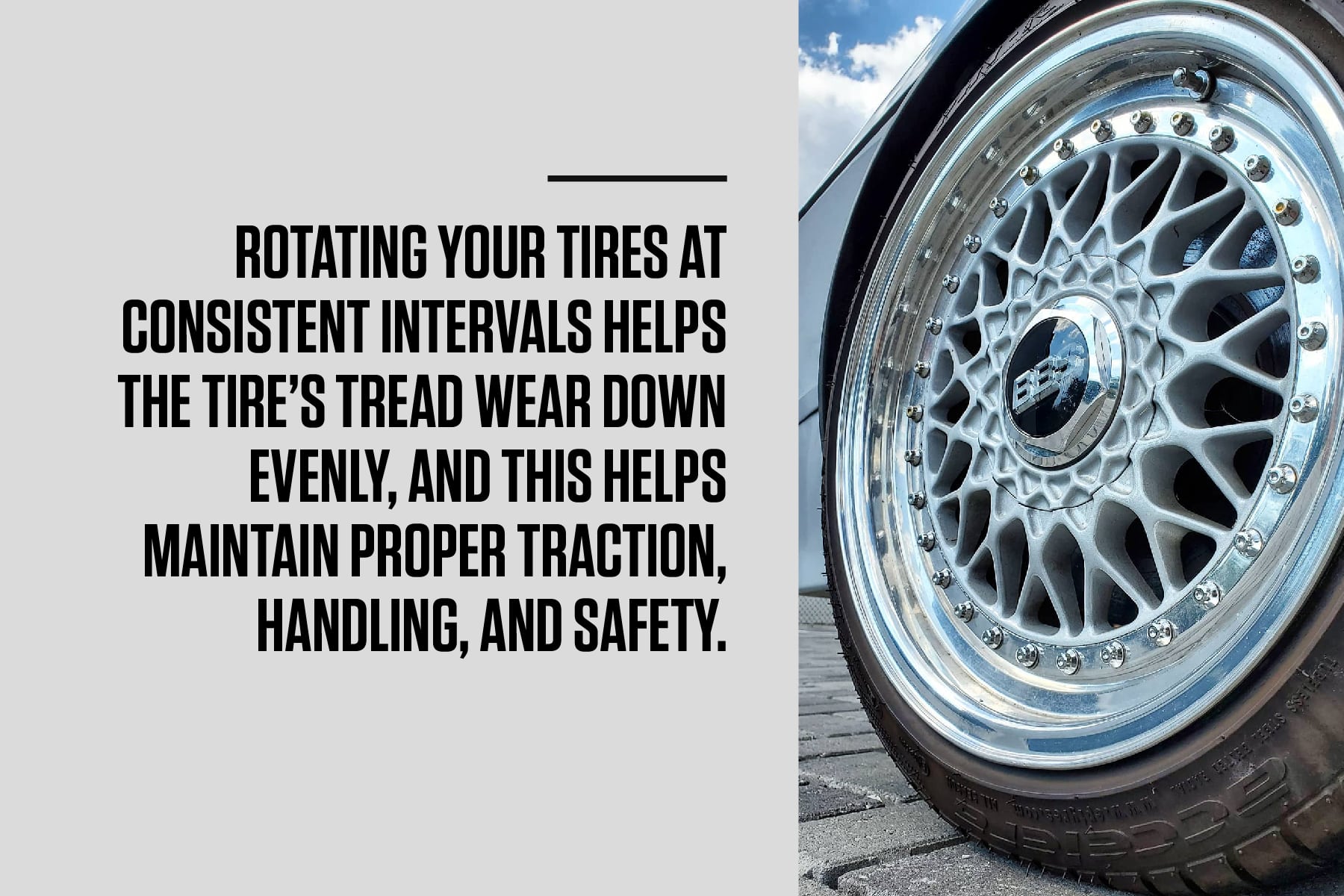
Sunroof Drains
Many manufacturers don’t typically suggest cleaning your sunroof drains regularly, so dealers rarely recommend regularly cleaning the drains.
At Autohaus Social, we don’t agree with this mindset.
Your sunroof was not designed to be completely water-proof. There are tracks within the frame that allow excess water to travel to the front (left and right) and rear (left and right) drains.
If you park your car outside, especially if there are trees overhead, the drains should be cleaned every spring before the spring rains. If your vehicle is kept in a garage, then every 2 or 3 years will suffice.
We can’t stress the importance of cleaning your sunroof drains enough!
If these drains are not kept clean, you have the potential for water damage to your VW’s interior. And we’re not just talking about water on the floorboards - you can have water in the electrical and mechanical systems as well.
What does one hour once a year cleaning your sunroof drains save you? Potentially thousands of dollars in repairs!
Choosing Proper Fluids for your Volkswagen
At one time, automotive fluids (brake, coolant, oil, etc.) were mostly universal. But in recent decades, as vehicles and technology have developed, specialization has become necessary.
If you see a fluid claiming to be universal, NEVER put it in your VW!
Today, all fluids you put in your vehicle must be engineered to meet your VW’s specific needs.
For example, if you mix a Ford coolant (antifreeze) with a VW coolant, you can cause severe damage to the engine cooling system. Using incorrect fluids can also result in voiding the manufacturer’s warranties.
Here is a guide to knowing which fluids you should use to maintain your Volkswagen properly.
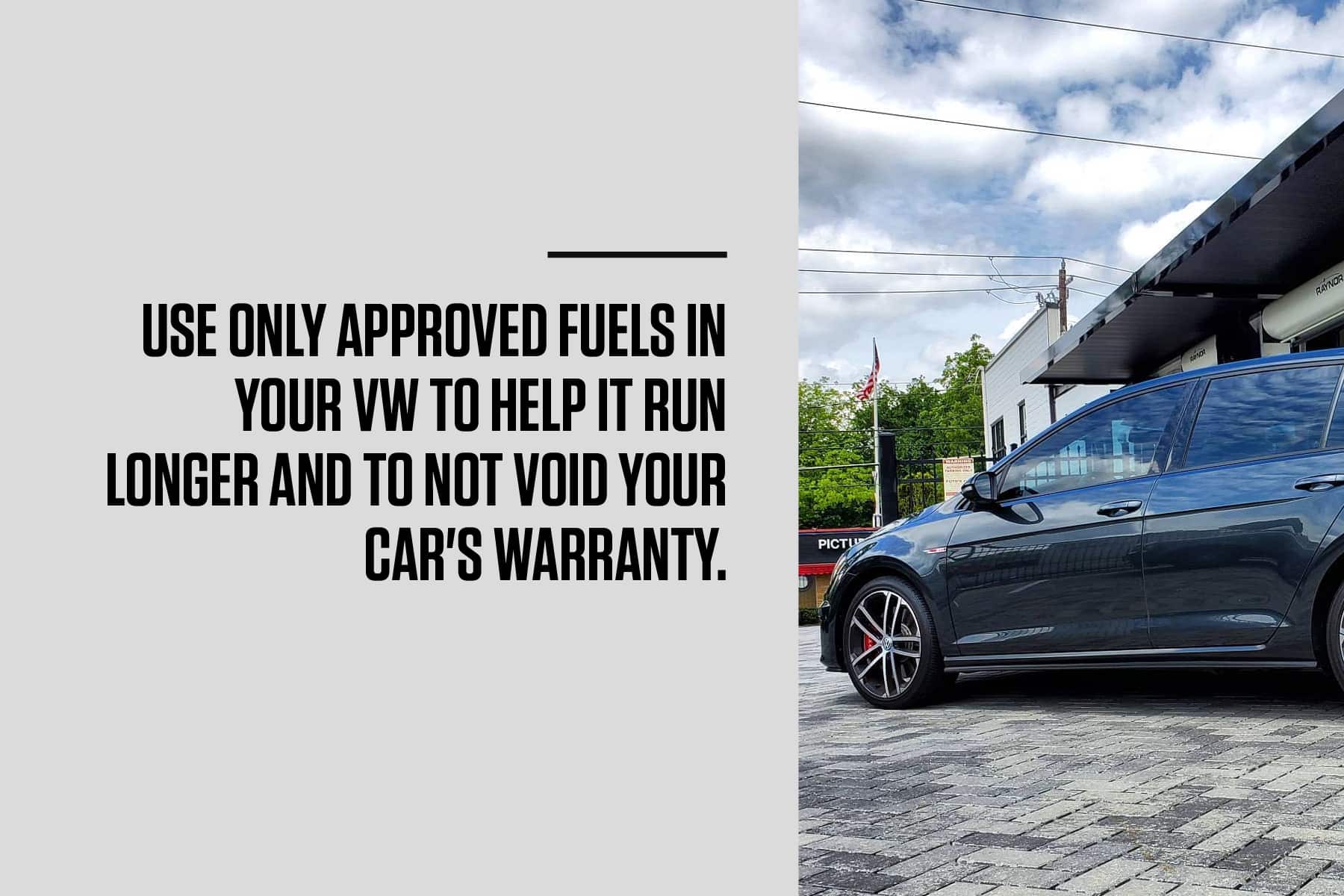
Proper Oil for Your VW
Each manufacturer requires a particular weight oil for the engine and a specific “add-pack” designation.
Having the correct oil weight is critical for the engine to maintain the proper crankcase pressure (the engine’s interior pressure when running).
It is equally important to pay attention to the Add Pack. An Add Pack is the designated amount of additional chemicals in the oil to improve the oil’s performance.
Common Add Pack additives are corrosion inhibitors, detergent additives, anti-oxidation additives, friction modifiers, anti-foaming agents, and more.
Using these additives helps the engine perform better, but you must be using the correct Add Pack!
Check the Add Pack designation on the oil container and bottle, and make sure it lines up with the manufacturer’s specs - don’t use just “any old oil” you find at an auto shop. For example, the 5W40 Add Pack designation for a 2004 VW GTI 1.8T engine is 505-01.
If you have more questions on oil designations or Add Pack additives, please contact a local Volkswagen dealer or certified service shop.
Proper Gas and Fuel
Many drivers often wonder what fuel they should be putting in their VW or other European cars. After all, there are different opinions on the fuel type or rating you should be using.
So, what fuel do we recommend for your VW?
Many vehicles have the minimum octane rating either on the gas cap or on a decal inside the fuel door. However, for your Volkswagen (or any European car), we recommend using premium fuel (91 or 93), even if the gas cap states a lower rating is acceptable.
Why do we suggest only premium fuels?
It comes down to a basic principle - the higher the octane rating, the cleaner and more efficient the fuel quality.
While premium fuels cost slightly more at the pump, we believe it is well worth the additional cost to maintain your vehicle in the long run.
Along with using a higher octane fuel, it is important to purchase good, clean fuel. A good rule of thumb is to buy fuel from a busier station because the longer fuel sits in the below-ground tanks, the more contaminants are likely to be present.
Also, purchase only “top tier” gasoline. If the station does not display a decal claiming top tier fuel, you may want to look elsewhere.
What about retail giants who have fuel pumps at their stores (Walmart, Costco, Kroger, etc.)?
Do your research before buying gas at these pumps as the source and quality of fuel often change from one delivery to the next.
If your VW uses diesel, quality and source are still critical, and the quality suggestions above still apply.
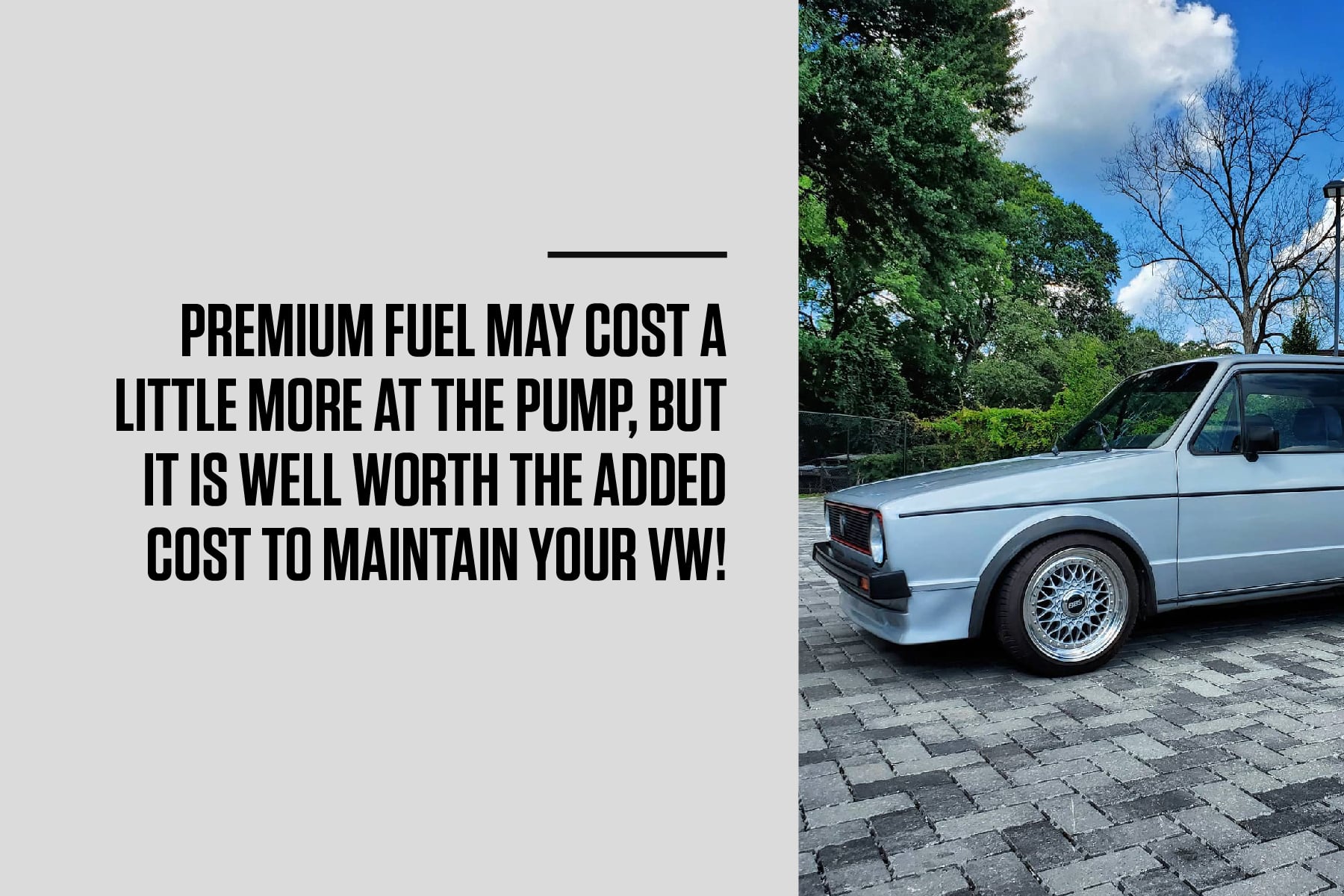
Coolant and Antifreeze Fluids
The only coolant or antifreeze to use in a Volkswagen is labeled as G12 or G13 and a pink (almost a light-purple) color.
It is critical never to mix coolants!
There are several reasons, but the biggest reason is that every coolant has a boiling point. Mixing different coolants can result in pressure irregularities within the coolant parts, causing weaker parts to rupture, even when the car is running at a normal operating temperature.
If your VW has a slight coolant leak, and you need to add something before you can have it properly repaired, only use distilled water.
Transmission Fluid
Like other fluids, the transmission fluid designation depends on your VW’s year, model, and transmission type.
Using the wrong fluid in the transmission can cause immediate failure, and we highly recommend that transmission services for Volkswagens be performed only by professional and trained VW technicians.
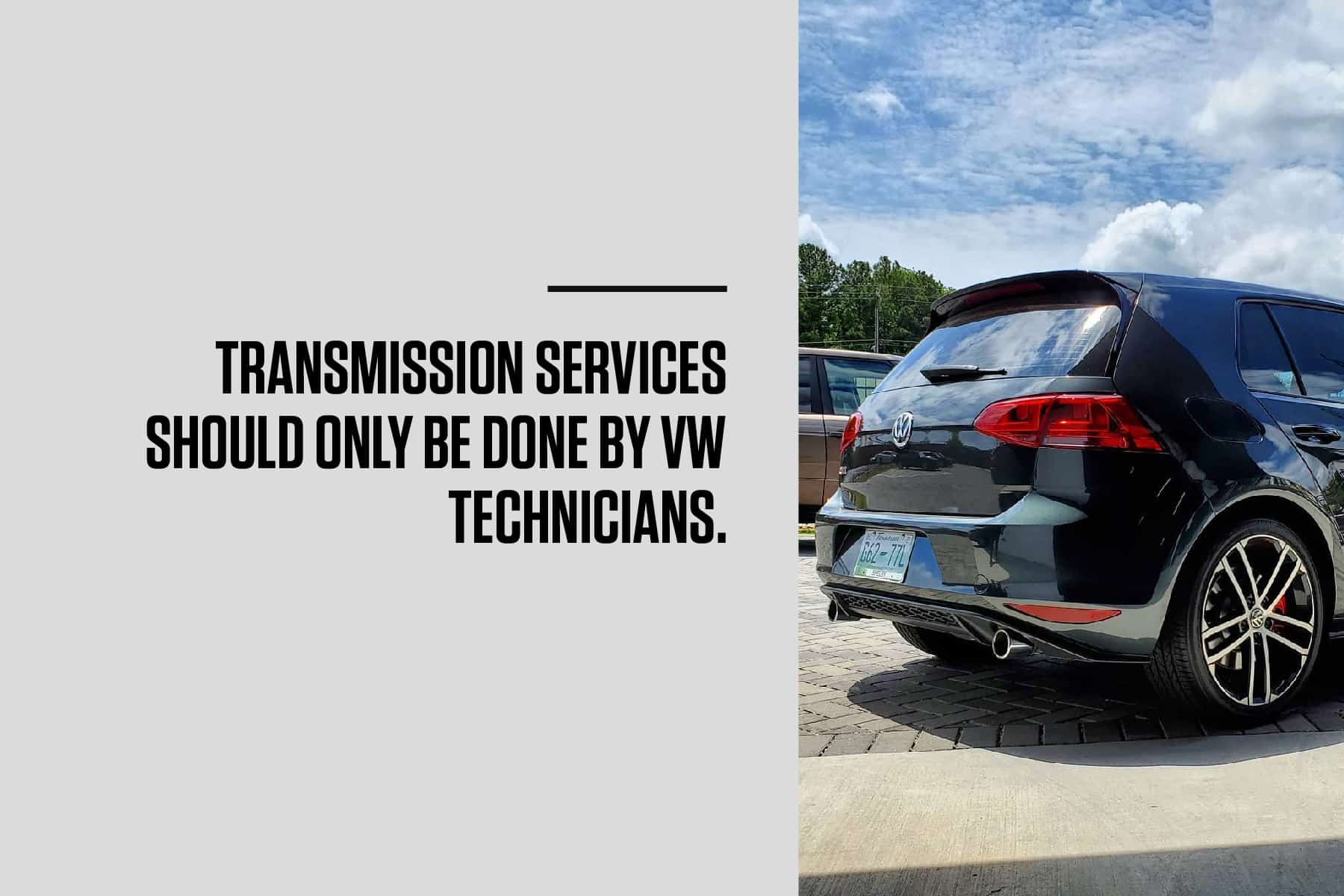
Brake Fluid
For the VW group, the brake fluid must be a DOT4 full synthetic brake fluid. The brake fluid brand is not as critical as long as it is DOT4 full synthetic.
Power Steering Fluid
Volkswagens use a mineral-based hydraulic fluid (CHF-11) for their power steering. This is not an ATF type fluid.
Non-scheduled VW Service & Repairs
Just like any vehicle, you should expect and plan for other necessary maintenance. This includes wear items like tires, brakes, suspension bushings/components, and batteries.
It also includes services not based on a schedule, such as tire alignments and intake carbon cleaning services.
Any reputable Volkswagen repair facility should forewarn you before these important items are in a critical state. This helps you anticipate what additional maintenance measures are due and plan or budget accordingly.
These non-scheduled maintenances are required for any vehicle. The intent of keeping scheduled maintenance is to reduce the likelihood of more costly expenses and repairs.
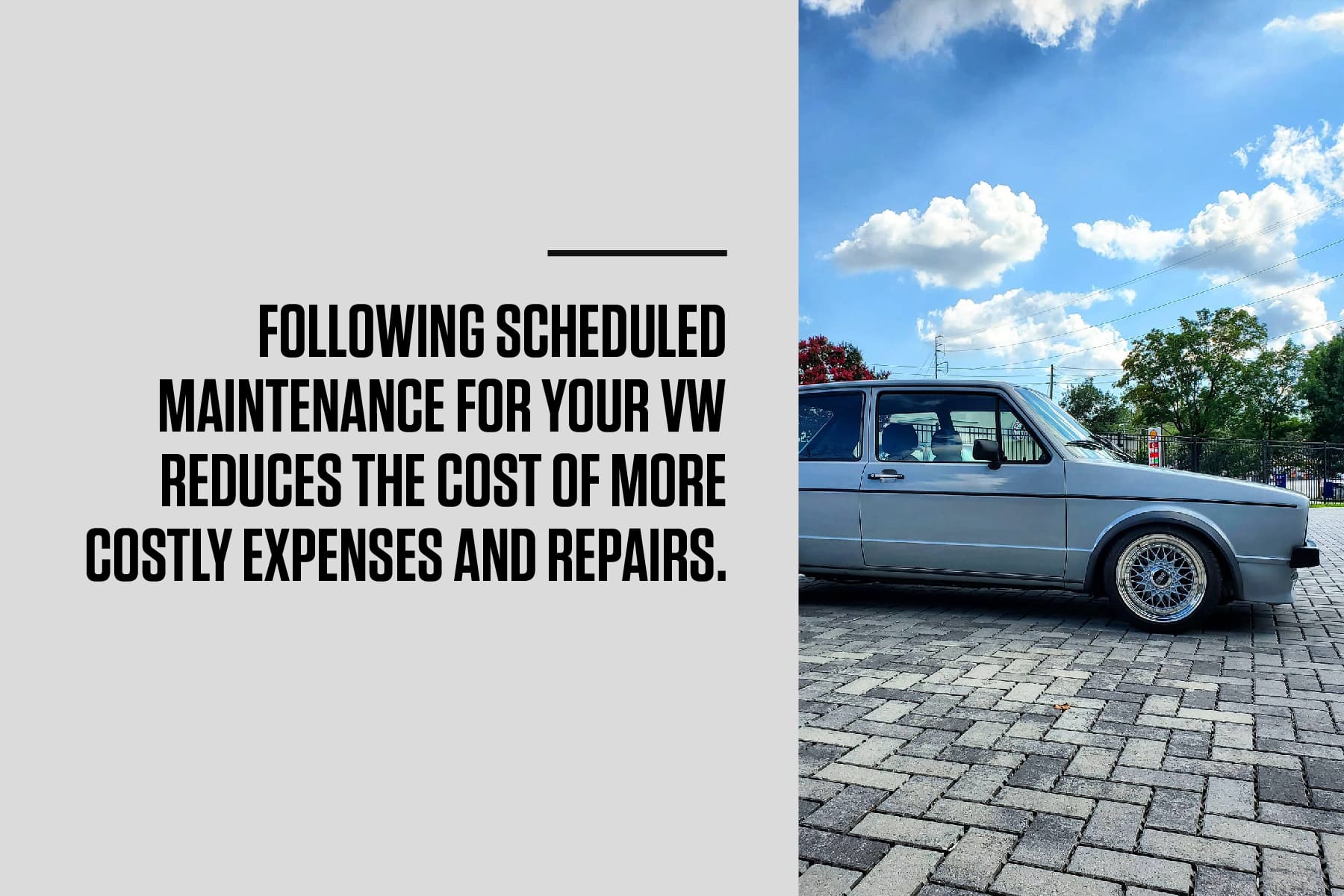
Conclusion
Congratulations, you are well on your way to keeping your VW in great condition - we just went through a lot of information on regular maintenance!
Since you already own a Volkswagen, it is obvious you are able to make wise car decisions. Continue applying this mentality to the upkeep and maintenance of your VW, and you’ll achieve ultimate “Fahrvergnugen” for many years to come.
If you are looking for a local VW service in Atlanta, contact the team at Autohaus Social today.
Not only do we provide the best European car services and repairs, but we also do them with ethical service. All our mechanics are A-level certified, and our state-of-the-art equipment and tools ensure your car is well-maintained and in good hands.
Schedule an appointment today for your VW, and see why Autohaus Social is the go-to service center for European cars in the greater Atlanta area!


buy cialis online https://telegra.ph/Technology-A-linchpin-To-Maintain-Businesses-Handle-Remote-Workforce-Amid-Pandemic—Technology-02-16
Great data, With thanks!
canadian drugstore https://kertvbs.webgarden.com/
Thanks! I appreciate it.
global pharmacy canada https://kernyusa.estranky.sk/clanky/risk-factors-linked-to-anxiety-disorders-differ-between-women-and-men-during-the-pandemic.html
With thanks. Fantastic information!
canadian pharmacies shipping to usa https://gerweds.over-blog.com/2022/03/modeling-covid-19-mortality-risk-in-toronto-canada-sciencedirect.html
Amazing write ups, With thanks!
tadalafil without a doctor’s prescription https://telegra.ph/How-Has-The-COVID-19-Pandemic-Changed-Our-Lives-Globally-02-24
You mentioned it superbly!
most reliable canadian pharmacies https://keuybc.estranky.sk/clanky/30-facts-you-must-know–a-covid-cribsheet.html
Awesome advice. With thanks!
medication without a doctors prescription https://gwertvb.mystrikingly.com/
Thanks a lot, Quite a lot of advice!
speaking rock casino online gambling https://download-casino-slots.com/
$10 deposit online casino https://firstonlinecasino.org/
online casino payza https://onlinecasinofortunes.com/
real money online casino no deposit https://newlasvegascasinos.com/
online casino ideal betaling https://trust-online-casino.com/
biggest online casino https://onlinecasinosdirectory.org/
free online casino slots https://9lineslotscasino.com/
dover downs online casino https://free-online-casinos.net/
bitcoin online casino https://internet-casinos-online.net/
jacks casino online https://cybertimeonlinecasino.com/
free casino games online https://1freeslotscasino.com/
gun lake online casino https://vrgamescasino.com/
the borgata online casino https://casino-online-roulette.com/
best canadian online casino https://casino-online-jackpot.com/
hardrock casino online https://onlineplayerscasino.com/
riversweeps online casino sign up https://ownonlinecasino.com/
swedish online casino https://all-online-casino-games.com/
best online casino reviews https://casino8online.com/